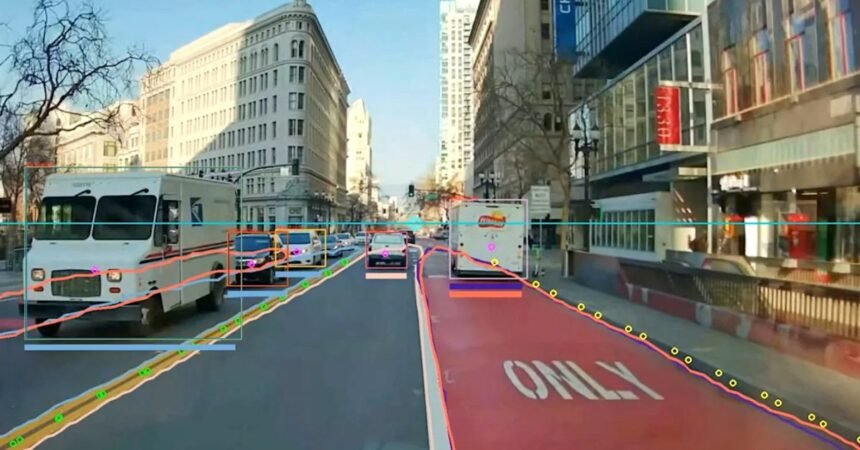Barcelona Launches Automated Bus Lane and Bus Stop Enforcement Pilot with Hayden AI
Barcelona, known for its innovative approach to urban planning and sustainability, has recently implemented a cutting-edge initiative to improve public transport services within the city. In a move that combines technology with public transportation, the City of Barcelona has partnered with Hayden AI to launch an automated bus lane and bus stop enforcement pilot program.
The pilot program utilizes advanced artificial intelligence technology developed by Hayden AI to enhance bus circulation and ensure the efficiency of reserved lanes and stops. By feeding camera data from the city’s electric buses into the AI system, Barcelona aims to identify and address issues related to private vehicles illegally using bus lanes, which disrupt the reliability and convenience of public transport services.
According to Laia Bonet, the First Deputy Mayor for Urban Planning, Ecological Transition, Urban Services, and Housing at the Ajuntament de Barcelona, the partnership with Hayden AI aims to pinpoint problem areas affecting public transport services and gather statistical information to improve bus circulation.
Currently operating on the city’s H12 and D20 bus lines as a pilot program, the AI system installed on the electric buses detects vehicles committing static violations in bus lanes and stops, such as unauthorized stopping or parking. The system then analyzes the data collected during the buses’ daily routes to provide valuable insights into the challenges faced by public transport services.
Despite the capabilities of the AI system to photograph and record video sequences of violations, Hayden AI assures that it does not capture license plates or personal information, and no penalties are issued to drivers or vehicle owners based on the data collected. However, the manual review of footage by Transports Metropolitans de Barcelona (TMB) officers has raised concerns about the potential for automated ticketing once the pilot program concludes.
In a cautionary tale from New York City, where AI-powered cameras issued over 290,000 tickets in just three months, generating millions in revenue but also highlighting significant errors in ticketing accuracy, the implementation of automated enforcement systems raises questions about reliability and oversight. With AI systems prone to hallucinations and errors, the potential for misidentifying violations and issuing unjust fines remains a critical concern.
As Barcelona continues to test the automated bus lane enforcement pilot with Hayden AI, the future of AI-powered public transport monitoring will require careful consideration of ethical and accuracy issues to ensure the fair and effective implementation of technology in urban environments. The partnership between Barcelona and Hayden AI represents a step towards leveraging technology for sustainable urban mobility while addressing the challenges of enforcing public transport regulations in a rapidly evolving urban landscape. The concept of self-care has gained significant attention in recent years, and for good reason. In today’s fast-paced world, it’s easy to become overwhelmed and neglect our own well-being. Self-care is about taking intentional actions to care for our physical, mental, and emotional health. It is not selfish or indulgent; rather, it is a necessary practice to ensure we are operating at our best.
Self-care looks different for everyone, as each person has unique needs and preferences. For some, self-care may involve taking a bubble bath, going for a walk in nature, or practicing yoga. For others, it may mean setting boundaries with work or social commitments, getting enough sleep, or seeking therapy. The key is to identify what activities make you feel recharged, refreshed, and at peace, and to prioritize them in your daily routine.
One important aspect of self-care is recognizing and honoring your limits. It’s easy to feel pressure to constantly be productive or to say yes to every request that comes your way. However, this can lead to burnout and exhaustion. By setting boundaries and learning to say no when necessary, you can protect your energy and prevent yourself from becoming overwhelmed.
Another crucial component of self-care is practicing self-compassion. We are often our own harshest critics, but it’s important to treat ourselves with the same kindness and understanding that we would offer to a friend. This means acknowledging our mistakes and shortcomings without judgment, and offering ourselves grace and forgiveness.
Incorporating self-care into your daily routine can have numerous benefits. It can help reduce stress, improve mental clarity, boost mood, and enhance overall well-being. By making self-care a priority, you are investing in your long-term health and happiness.
In conclusion, self-care is a vital practice that everyone should prioritize in their lives. By taking intentional actions to care for your physical, mental, and emotional health, you can cultivate a greater sense of well-being and resilience. Remember, self-care is not a luxury—it is a necessity.







